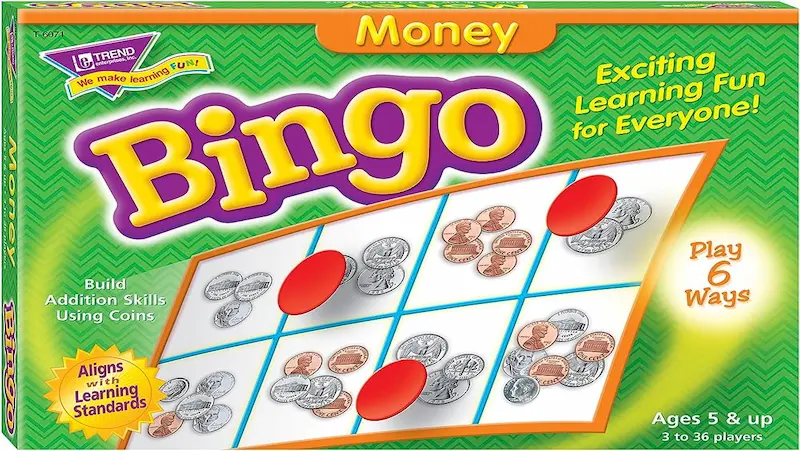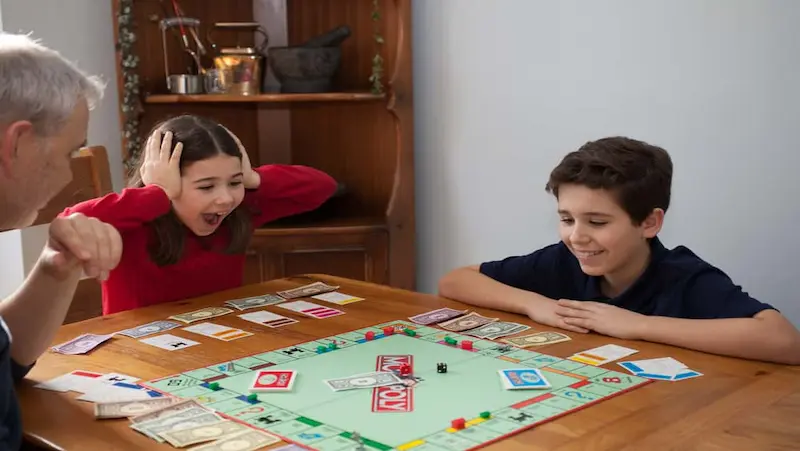Hey there! Ever thought learning about money could be fun? Well, guess what? Financial games are here to make it exciting for students, whether they’re in the classroom or chilling at home. Forget the boring lectures – these games are like secret agents, teaching you all about money, savings, and smart spending without you even realizing it. Get ready to play your way to financial wizardry!
Table of contents
The Importance of Financial Games
In a world where managing money is a crucial life skill, finding engaging and effective ways to teach financial concepts to students is more important than ever. One innovative approach gaining traction is the use of financial games. Let’s explore why these games are becoming a valuable tool in the classroom.

1. Making Learning Fun:
Traditional lectures and textbooks can be, let’s face it, a bit dull. Financial games inject an element of fun into the learning process. By turning complex financial concepts into a game, students are more likely to stay engaged and retain important information. After all, who doesn’t love a good game?
2. Real-world Simulations:
Financial games often simulate real-world scenarios, allowing students to make financial decisions in a risk-free environment. Whether it’s budgeting activities for kids, investing, or understanding the consequences of financial choices, these games provide a safe space for students to learn from their mistakes without real-world consequences.
3. Hands-on Experience:
There’s a famous saying: “Tell me, and I forget. Teach me, and I remember. Involve me, and I learn.” Financial games involve students directly in the learning process. By actively participating in decision-making and problem-solving within the game, students gain a hands-on understanding of financial principles.
4. Building Critical Skills:
Financial games go beyond just teaching numbers; they help develop critical life skills. Decision-making, problem-solving, strategic planning, and teamwork are all integral parts of financial games. These skills are not only essential in managing fun money activities but are transferable to various aspects of life.
5. Encouraging Healthy Competition:
Many financial games are designed as competitive activities, fostering a sense of healthy competition among students. This not only adds excitement to the learning process but also instills a sense of motivation to excel and improve financial decision-making skills.
6. Preparing for the Future:
In the real world, understanding how to manage finances is a key component of adulting. Financial games equip students with the knowledge and skills they need to navigate the complexities of personal finance confidently. This preparation is an investment in their future financial well-being.
Classroom Financial Games:
In the dynamic world of education, bringing financial concepts to life can be a challenge. However, the power of games can turn a seemingly complex topic into an enjoyable and interactive learning experience. Here are a few creative financial games perfect for the classroom:

1. Money Bingo:
Forget the regular bingo! Money Bingo transforms financial terms and concepts into a lively game. Students can match terms like “savings account” or “interest rate” on their bingo cards, making learning about money management a joy.
2. Investment Adventure:
Imagine embarking on an investment journey without any real money at stake. In this simulated investment game, students can learn about stocks, bonds, and financial markets in a risk-free environment. It’s a hands-on way to understand the dynamics of investing.
3. Budgeting Challenge:
Make budgeting exciting with a hands-on challenge. Students are given a virtual salary and must allocate it wisely across various expenses like housing, food, and entertainment. This game helps instill practical budgeting skills in a playful setting.
4. Cashflow Board Game:
Adapted for the classroom, the Cashflow board game by Robert Kiyosaki is an entertaining way to teach kids about financial independence and the importance of assets and liabilities. It’s an engaging tool to impart valuable lessons about money management games for youth.
5. Marketplace Math:
Transform the classroom into a mini marketplace. Assign students roles as buyers and sellers, and let them engage in real transactions using play money. This game not only teaches basic math skills but also introduces economic concepts like supply and demand.
7. Credit Card Crunch:
Understanding the pitfalls of credit cards is crucial. In this game, students navigate through a maze of financial decisions, learning about interest rates, minimum payments, and the consequences of late payments. It’s an eye-opener about the responsible use of credit.
Home-Based Financial Game:
In the hustle and bustle of daily life, finding moments to connect with our kids can be a challenge. But what if we told you that the solution is right at your fingertips – in the form of games that not only entertain but also educate? Here are a couple of simple yet engaging games you can play with your little ones, turning ordinary moments into extraordinary memories.

1. Grocery Store Challenge: Budgeting Bonanza
Who said grocery shopping has to be a mundane chore? Transform your next trip to the store into a thrilling budgeting game. Give your child a set amount of play money and let them make decisions about what to buy within that budget. This not only teaches them about money management but also turns a routine task into an exciting adventure.
2. Entrepreneurial Lemonade Stand: Business Basics Made Fun
On a sunny day, why not set up a lemonade stand with your kiddos? This classic activity isn’t just about sweetening the neighborhood but also provides a golden opportunity to introduce basic business concepts. From pricing their product to counting change, your little entrepreneurs will be learning valuable life skills without even realizing it.
3. Indoor Treasure Hunt: A Quest for Fun and Learning
Rainy day or not, an indoor treasure hunt is a fail-proof way to spark excitement. Create clues related to everyday items or educational questions, guiding your child from one spot to another. Not only does this game unleash their inner detectives, but it also sneaks in a bit of knowledge while they search for the hidden treasure.
4. Storybook Charades: A Twist on the Classic Game
Take the classic game of charades to the next level by incorporating your child’s favorite storybook characters. Act out scenes or ask them to interpret their favorite characters through gestures. This not only enhances their creativity but also encourages a love for reading.
Online Financial Games:
Ever thought about merging the thrill of gaming with the world of finance? Well, guess what? Online financial games are here to make your financial journey a whole lot more exciting. Let’s dive into the world of pixels and profits with different types of these games that can turn learning about money into a total blast!

1. Stock Market Simulators:
Imagine a virtual stock market where you can buy and sell stocks without risking real money. Stock market simulators allow you to test your investment skills in a risk-free environment. It’s like having your own Wall Street adventure from the comfort of your couch!
2. Budgeting Challenges:
Ever wished budgeting could be as fun as a video game? Well, it can be! Online budgeting games let you manage virtual money, make spending decisions, and face financial challenges. It’s like leveling up your budgeting skills while having a good time.
3. Crypto Trading Games:
Curious about the world of cryptocurrencies like Bitcoin and Ethereum? Crypto trading games let you experience the highs and lows of the crypto market without investing real money. It’s a rollercoaster ride where you can learn about digital currencies in a playful way.
4. Entrepreneurial Adventures:
Ready to be the next big entrepreneur? Some games simulate the experience of running a business. From making strategic decisions to handling finances, these games provide a taste of the business world without the real-world risks.
5. Economic Strategy Games:
Ever thought about running your own country’s economy? Economic strategy games let you take charge of a nation’s finances. You can make decisions about taxes, government spending, and economic policies. It’s like being the mastermind behind an entire economy!
DIY Financial Games:
We get it – budgeting and managing money can be about as fun as watching paint dry. But what if we told you there’s a way to turn this financial chore into an exciting game? Yup, you heard it right! Let’s dive into the world of DIY Financial Games and make money matters a breeze.

Game 1: Budget Bingo
Who said budgeting had to be a snooze-fest? Create a Budget Bingo card with different spending categories – groceries, entertainment, bills, you name it. Assign a budget to each square, and as you spend, mark off the corresponding box. Your goal? Get a “Bingo” without going over your overall budget. It’s like a game night, but for your wallet!
Game 2: Savings Scavenger Hunt
Saving money doesn’t have to be a drag. Turn it into a scavenger hunt! List out items or activities you want to save for and assign a point value to each. The more expensive, the higher the points. Challenge yourself to earn those points by saving money on everyday expenses. Hit your target, and you’ve won the Savings Scavenger Hunt!
Game 3: Investment Jenga
Investing can be intimidating, but not with Investment Jenga! Assign different investment options to Jenga blocks – stocks, bonds, real estate, you name it. As you play, each block you pull represents where to invest your next bit of cash. Just like in Jenga, the key is balance. Watch your investments grow as you keep your financial tower sturdy!
Game 4: Debt-elimination Dominoes
Got some pesky debts? Knock them down with Debt-elimination Dominoes! Write your debts on domino tiles and arrange them in order from smallest to largest. As you pay off each debt, knock down the corresponding domino. The satisfaction of watching those tiles tumble will make you forget you’re on a financial mission.
Game 5: Money Memory Match
Sharpen your financial memory with Money Memory Match. Create pairs of cards, each with a financial term and its definition. As you play, match the terms with their meanings. It’s a fun way to learn and understand money lingo while improving your memory. Plus, it’s a game you can play solo or with friends!
Overcoming Challenges:

Tech Troubles:
Okay, we get it. Not everyone’s a tech whiz. Setting up these games might throw a few curveballs, especially if you’re not a coding genius. Solution? Don’t panic! Team up with a tech-savvy pal or explore user-friendly platforms that make things smoother.
Boring Budgets:
Budgets can be about as thrilling as watching paint dry. Getting people excited about managing their moolah can be tough. Spice it up! Add a dash of creativity, colorful visuals, and maybe a bit of friendly competition to turn budgeting from “ugh” to “ooh!”
User Engagement Drop-off:
Ever started something with a bang only to see interest fizzle out like a deflated balloon? It happens. Keep things fresh! Regularly update content, throw in surprises, and listen to feedback. You want players coming back for more, not yawning and moving on.
Financial Jargon Jitters:
Wall Street lingo can make anyone’s head spin. Don’t drown your players in financial mumbo-jumbo. Break it down! Explain concepts in simple terms, use relatable examples, and keep it light. Remember, you’re not trying to put them to sleep with a finance-to-kids textbook.
Monotony Mayhem:
Playing the same game repeatedly can make anyone snooze. Mix it up! Introduce new challenges, levels, or scenarios. Make sure each round feels like a fresh adventure, not a Groundhog Day rerun.
Conclusion:
In wrapping things up, let’s make money matters more interesting! Teaching children about finance money smarts should be like a cool adventure, not a boring lecture. So, let’s get hands-on with fun activities that make dollars and cents click. Because when learning’s a blast, being money-savvy becomes a piece of cake!
To get your hands on more such articles, educational content, and free resources on coding for kids, robotics courses, game development, etc., check out the BrightCHAMPS Blog Page now!
Frequently Asked Questions
A1: Sure thing! Games like “Monopoly” and “The Game of Life” are classics. For a modern twist, try “Money Bags” or “Piggy Bank Adventure.” These make learning about money fun and practical.
A2: Absolutely! “Cashflow for Kids” and “Bite Club” are great for classrooms. They mix fun and learning, helping students understand money management in a cool way.
A3: Good question! Financial games teach kids to budget, save, and make smart choices. It’s like learning by doing, and it sets a solid foundation for real-life money skills.
A4: Definitely! “Payday” and “Money Island” are awesome board games. Online, “FamZoo” and “PiggyBot” make learning about money super interactive.
A5: Great idea! Play games like “Money Bingo” or “Grocery Store Scavenger Hunt.” These activities make everyday situations a fun way to teach kids about money.
A6: Yes! Games like “Money Metropolis” and “Gen i Revolution” work well online. They engage students in a virtual world, teaching financial skills in a tech-savvy way.


 We are an army of educators and passionate learners from BrightChamps family, committed to providing free learning resources to kids, parents & students.
We are an army of educators and passionate learners from BrightChamps family, committed to providing free learning resources to kids, parents & students.












